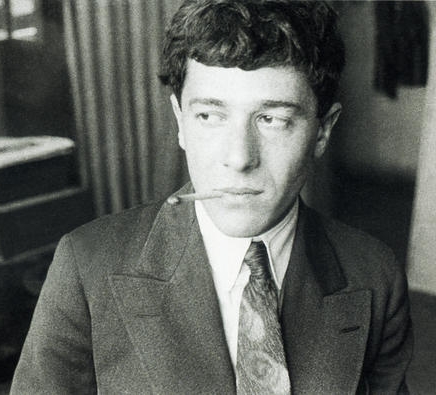The famous Soviet poet Semion Kirsanov (birth name: Samuil Kortchik) was born in 1906 in Odessa. His father, Itsek Kortchik, was a well-known ladies' tailor.
In 1914, Samuil entered a classical gymnasium in Odessa. By the time he finished it in 1923, several years after the Bolshevik Revolution, it was already a Soviet school. Kortchik subsequently became a student at the Department of Philology of the Odessa Institute of National Education (now the Odessa I. I. Mechnikov National University). In 1920, Samuil joined the Poets' Collective, an Odessa-based group of poets and prose writers. Among its members were such luminaries as Eduard Bagritskii, Iurii Olesha, Ilia Ilf, and Valentin Kataev.
Swept away by the ideas of the Russian Futurists, who enjoyed great popularity among Odessa's literati, the young Samuil set up the Odessa Association of Futurists. Subsequently, in 1922, he was involved in creating an avant-garde youth theater in the city, writing plays for it and acting on its stage. It was at that time that he came up with the pseudonym Korsemov (a combination of the initial syllables of his first and last names). At the time, Semion Kirsanov was also a prolific contributor to local newspapers such as Odesskie izvestiia and Moriak.
During a visit to Odessa, the celebrated Soviet poet Vladimir Maiakovskii heard some of Kirsanov's poems and was greatly impressed with them. Eventually, Kirsanov would come to regard himself as Maiakovskii's literary heir.
In 1925, at Maiakovskii's suggestion, Semion Kirsanov moved to Moscow. There, he gradually achieved great renown, contributing to various publications and teaching at Moscow's Literary Institute. Among his students at the Faculty of Poetry were Boris Slutskii and Mikhail Kulchitskii. He played a major role in creating the Writers' Club, which became one the hubs of literary life in the Soviet capital.
When the Wehrmacht invaded the Soviet Union in late June 1941, Kirsanov was one of the organizers and leaders of the literary "brigade" that drew up the placards known as the TASS [the Soviet telegraphic agency] Windows. These were patriotic propaganda posters with satirical verses a nd anti-German cartoons, aimed at raising morale among the Soviet troops. Shortly thereafter, having gotten the TASS Windows project off the ground, Semion Kirsanov volunteered for frontline duty. Initially, he was sent to the Northwestern Front, where fierce fighting was going on in the area of Novgorod. Kirsanov served there as the military correspondent of the Red Army's major press organ, Krasnaia Zvezda. He was subsequently dispatched to Belorussia as the newspaper's correspondent on the Central Front. Once, during a retreat, the group that Kirsanov was accompanying was surrounded by the enemy. Through some miracle, he managed to break out of the encirclement. In the course of the war, Kirsanov also served on the Kalinin and Karelian Fronts, and took part in the fighting for Sevastopol. He was shell-shocked twice.
Many of his poems appeared in frontline newspapers, and his book Poema fronta [Epic Poem of the Front] came out during the war. The satirical poem "Zavetnoe slovo Fomy Smyslova, russkogo byvalogo soldata" [The Secret Word of Foma Smyslov, an Experienced Russian Soldier], written by Kirsanov between 1942 and 1944, circulated widely among Soviet soldiers, being particularly popular at the front.
In 1945, Semion Kirsanov was discharged from the army and returned to Moscow. That year also saw the publication of his collection Stikhi voiny: iz proizvedenii 1941-1945 [War Poems: A Selection from the Works of 1941-1945].
In the early 1950s, Semior Kirsanov became a prolific translator of poems by Heinrich Heine, Adam Mickiewicz, Berthold Brecht, and others. He was published even during the postwar period of Stalinist antisemitism. However, these publications excluded his avant-garde experimental poems. The authorities did not persecute him, and he was thus able to participate in Soviet literary activities. He was awarded the Stalin Prize (1951), two Orders of the Labor Red Banner (in 1939 and 1956), the Order of Lenin (1966), and several medals.
Semion Kirsanov died in Moscow in 1972, and was buried at the prestigious Novodevichie Cemetery.







